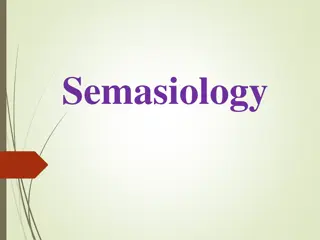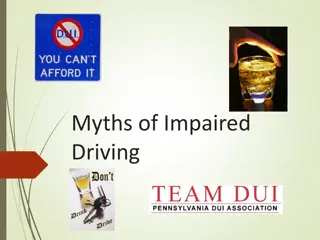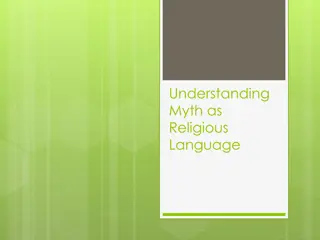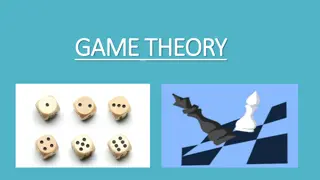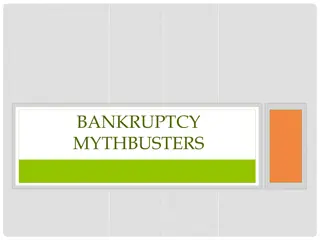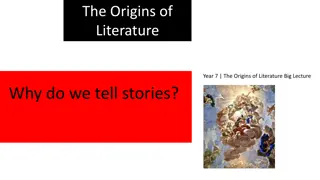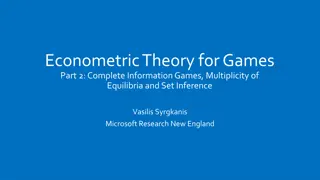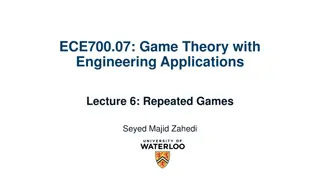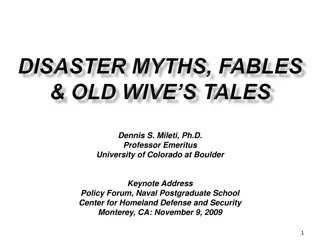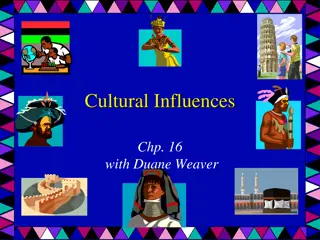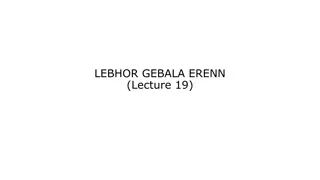Understanding Myths and Language Games: Exploring Meaning and Challenges
Explore the significance of creation myths, myths of good and evil, and heroic myths across different cultures, alongside the challenges of competing myths and changing interpretations over time. Delve into the concept of language games and the role of religious language in conveying meaning, while considering the limitations and complexities it poses in communication and understanding.
Download Presentation

Please find below an Image/Link to download the presentation.
The content on the website is provided AS IS for your information and personal use only. It may not be sold, licensed, or shared on other websites without obtaining consent from the author. Download presentation by click this link. If you encounter any issues during the download, it is possible that the publisher has removed the file from their server.
E N D
Presentation Transcript
Homework due Complete all activities in the booklet up to page 26 Research and ensure you bring into college examples of creation myths, myths of good and evil and heroic myths one Christian and one other Read and make notes on the article about Wittgenstein at the back of the booklet
Examples of myths of good and evil The story of Job This is a good example to use as we referred to it last year when we studied the Problem of Evil and Suffering. Hercules
Examples of myth Creation Other myths good and evil and hero myths Christian Other religion or culture
Homework feedback Common themes in creation myths In groups Read/discuss the creation myths Identify common themes Chaotic formless state existed before the creation of the universe (body of water) A god who exists in a void performs some action which results in the universe coming into being Human appear, usually in the final stage This appearance reflects a link between humans and the supernatural creative force
Supportive evidence different forms of myths to convey meaning: creation myths; myths of good against evil; heroic myths. Myths help to overcome fears of the unknown; myths effective way of transmitting religious, social and ethical values.
Challenges: problem of competing myths; meanings of myths change over time as they reflect the values of society as societal constructs; demythologisation of myths results in varying interpretations, myths often incompatible with scientific understanding of the world.
Language Game Theory Religious language as a language game: Meaningful to people who participate in same language game (Ludwig Wittgenstein). Supportive evidence non-cognitive form of language provides meaning to participants within language game; consider use of language not meaning; language games fit with coherence theory of truth; religious language as expressions of belief. Challenges, including rejection of any true propositions in religion that can be empirically verified; does not allow for meaningful conversations between different groups of language users; does not provide adequate meaning for the word God .
Wittgenstein What do we know about Wittgenstein already? Use your homework notes
Wittgenstein and Language Games Years after he had influenced the Logical Positivists, Ludwig Wittgenstein changed his views on how language works. In his Philosophical Investigations (published after his death), Wittgenstein focussed on the uses language can be put to. Famously, he wrote: Don t ask me for the meaning, ask for the use. So, he was less concerned with the truth or falsity of language (contrast the Logical Positivists) as his picture theory had been. For religious language, he thought that function might be more important than meaning. 1 Explain how Wittgenstein s ideas changed?
Language Games form of life Wittgenstein argued that language works through a series of languagegames . That is, meaning only comes out of context; we have to know what game that our terms are participating in. He then went on to say that problems in philosophy may occur through misunderstanding that words can be used in different language games. For Wittgenstein, meaning is all about observing convention just like in a game. There s a right way and a wrong way to do things. So with religion there might be conventional or unconventional ways to talk about God. The wire - It's all in the game 2 How did Wittgenstein think that language works in a game? Philosophical problems arise when language goes on holiday.
Activity Cricket! Try to explain the rules of cricket, some other team sport, hobby or the techniques of art or photography to someone else who knows nothing about the game or activity. What problems do you encounter? It might seem that the language only makes sense in the context of that game
Tool Box Analogy What do you think this analogy is? Check your answer page 5 paragraph 2 of the article
Language Games and Religion The theory of language games could be important because of the connection it makes with the coherence theory of truth . This is the view that statements are true if they fit with other statements and beliefs which are internally consistent. One could argue that the game of religious language cannot be criticised because internally it is coherent and intelligible. Religious views fit with other religious views. Perhaps religion is just a languagegame , and it will all make sense if we just participate. AO2 The danger of this is that it could be too relativistic, allowing that any claims are equally valid. It also doesn t explain how we could challenge truth claims. Also, it s not quite clear whether Wittgenstein thought of religion as a languagegame . He had a certain respect for religion, but wrote little about it himself. 3 Why did Wittgenstein believe we should not criticise language games and how does this connect to religious language?
Soul example Believer I have a soul Scientist I am going to try and find out if the soul is a physical object through testing What would Wittgenstein say was the problem with this? Use the terms Category mistake Clash of language games
The Religious Language Game: D.Z. Phillips One philosopher who has applied Wittgenstein s theory to religious belief is D.Z. Phillips. Phillips takes on the idea that religion is a language game, extending this to the claim that religion cannot be either grounded or criticised in reason it is a system all of its own. For Phillips, the reality of God or religion does not lie in the abstract issue of whether God exists, but instead is located in the words and practice of religion. What God is, is defined by the language game of faith. Just as in the general games of life, we do not require an abstract justification to work out what they are all about , so too with religion: we have to take part to find out. Question on the next slide If a philosopher wants to give an account of religion, he must pay attention to what religious believers do and say It is not the task of a philosopher to decide whether there is a God or not, but to ask what it means to affirm or deny the existence of God.
Examples Example I believe in God Explanation The key issue is what does it mean to believers not . . . Prayer Prayer is not about presenting facts the key question is . . . Not literal It refers to I believe in eternal life 4 Extra scholar - Explain how Phillips applied Wittgenstein s ideas to religious language?
Supportive evidence non-cognitive form of language provides meaning to participants within language game; consider use of language not meaning; language games fit with coherence theory of truth; religious language as expressions of belief. Read page 30 Highlight five pieces of supporting evidence Think of three examples from Christianity to demonstrate the coherence theory of truth Create spider diagram of key points and examples Can you make a link to any other areas of the course.
Challenges, including rejection of any true propositions in religion that can be empirically verified; does not allow for meaningful conversations between different groups of language users; does not provide adequate meaning for the word God . Read page 31 Highlight five challenges Think of three examples from Christianity to demonstrate the challenges Create spider diagram of key points and examples Can you make a link to any other areas of the course.
Picture sentence starter Put the picture in the correct order
Evaluating Language Games Supporting evidence It highlights the non-cognitive nature of religious language e.g. I baptise you this is to perform a ritual, it would gain its meaning from the context in which it was said it is understandable among the community of believers participating in the ritual of baptism, it announces the changed status of the participant to a full member of the community. This is a fairly specialised area, and the language is performing a specialised job. Challenges Believers claims cannot be empirically tested, believers can say anything that they want anything can be passed off as religious truth It alienates people not initiated into the rules of the game Religious statements do aim to correspond with reality God, Judgement & Afterlife are real to a believer, they are not simply ideas. Many religious statements do seem to be making assertions that exist at least partly in other areas, historical, even statements about the world like science, so surely it is an oversimplification to think that each area is self-contained with its own rules, and therefore that in some sense religious language must be at least partially open to judgement by say, historical or scientific rules . It distinguishes it from other forms of language It provides boundaries for the uses of language Statements are judged within their context they are not inherently true or false
Evaluating language games Strengths Criticisms One criticism of this is that then believers can say anything that they want anything can be passed off as religious truth Language games theory s strength is that it accounts for the way in which much language is used; there is not one correct way of applying rules of meaning outside of the circumstances in which the sentences are being said so jokes, cursing, blessings, cries of pain, analytical sentences, scientific sentences, all have their own internal coherence and meaning. Language games allow . .. Language games recognise that each religion is distinct
Criticisms of Wittgenstein / Phillips Wittgenstein s views on language are controversial, as they reject the popular view that language can be objective and scientific. He implies that our language can never convey truth in an absolute sense can we agree with that conclusion? Wittgenstein s theory implies that there could be no progress in philosophical debates, which are based on misunderstandings of language. Might this opinion be unduly negative? Phillips claims Wittgenstein to support his view of religion, but arguably this leads to irrationalism and blind faith. Why should believers be allowed to say that the game of religious language requires no justification? This could be used to justify extremism or superstition. 5 Summarise the criticisms in your own words
Some points to think about: Does language work in a game? Can you give examples? Is Phillips justified in seeing religion another language game ? Is Wittgenstein s later view right: is the use of language more fundamental than meaning?
Homework checker discussion activity Whereof we cannot speak . . .Steve McCarthy Read your notes on the article about Wittgenstein and check they include the answers the questions. 1. What was the picture theory of language? 2. What is Wittgenstein s concept of language games? 3. Give examples of how rules may change over time. 4. How are Wittgenstein s two theories different? 5. What criticisms does McCarthy identify?
Picture sentence summary Put the pictures in the correct order






